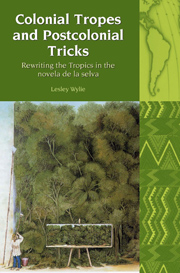Book contents
- Frontmatter
- Contents
- Acknowledgements
- Introduction
- 1 Colonial Tropes and Postcolonial Tricks
- 2 Tropical Nature and Landscape Aesthetics
- 3 Salvaging the Savage
- 4 Paradise Lost: Wilderness and the Limits of Western Escapism
- 5 Jungle Fever: Degeneration as a Trop[olog]ical Disease
- Conclusion
- Bibliography
- Index
1 - Colonial Tropes and Postcolonial Tricks
- Frontmatter
- Contents
- Acknowledgements
- Introduction
- 1 Colonial Tropes and Postcolonial Tricks
- 2 Tropical Nature and Landscape Aesthetics
- 3 Salvaging the Savage
- 4 Paradise Lost: Wilderness and the Limits of Western Escapism
- 5 Jungle Fever: Degeneration as a Trop[olog]ical Disease
- Conclusion
- Bibliography
- Index
Summary
Divina Poesía, […]
tiempo es que dejes ya la culta Europa,
que tu nativa rustiquez desama,
y dirijas el vuelo adonde te abre
el mundo de Colón su grande escena.
Andrés Bello, ‘Alocución a la Poesía‘This apostrophe, composed by Bello in 1823, instantiates a classic colonial encounter between the Latin American writer and the chequered legacy of the imperial past. Although Bello's poem could be read as arguing benignly that the innate rusticity of poetry, and its proclivity for pastoral and Romantic themes, might be better served by the luxuriant nature of the Americas, it also lends itself to a much more radical interpretation. The eponymous ‘Alocución’ is not only an entreaty for poetry to forsake ‘la culta Europa’ in favour of ‘el mundo de Colón’ but also an appeal to the American writer to appropriate European literary models, and to infuse into them a uniquely American flavour. Indeed, Bello's poem might be regarded as an exemplum of this mode of literary syncretism, for while it appears to conform structurally to traditional European versification, it is splintered between a rather formulaic recourse to classical imagery and awestruck descriptions of a marvellous and unknowable tropical nature. Although Bello does not explicitly reject European poetics, the insistent alterity of South America, which is defined as ‘otro cielo, […] otro mundo […], otras gentes’, abundantly reveals the necessity for the literary models of the Old World to be adapted to the physical realities of the New.
- Type
- Chapter
- Information
- Colonial Tropes and Postcolonial TricksRewriting the Tropics in the novela de la selva, pp. 14 - 39Publisher: Liverpool University PressPrint publication year: 2009



